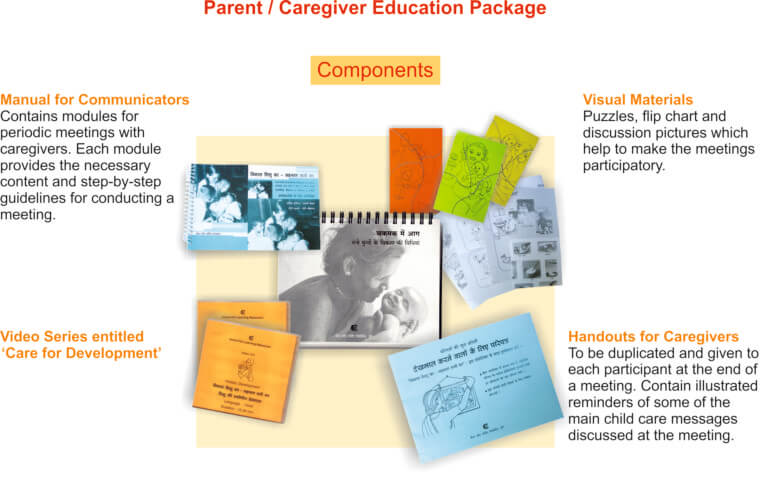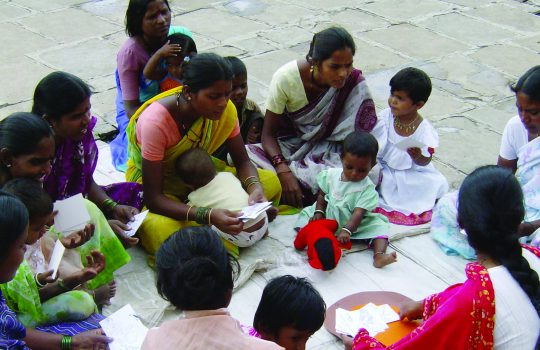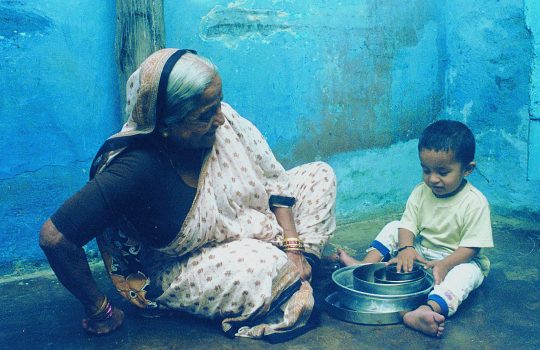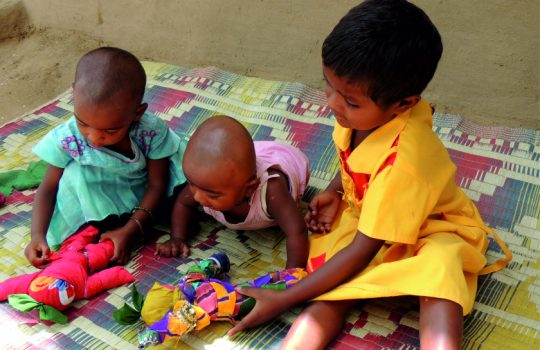Early Childhood Care and Development for Children, Birth to 3 Years
THE CONTEXT
The first 1000 days of life, between a woman’s pregnancy and her child’s second birthday, is the critical window of time for influencing lifelong health, social behavior, emotional well-being and intellectual development. Research in multiple disciplines has clearly established this. We now know that the human brain develops most rapidly in the earliest years, and that the effects of deprivation during the first 3 years often cannot be overcome later in life.
This is particularly true in India which has the largest number of stunted children in the world, resulting in negative impacts on later growth, cognitive development and learning outcomes, as well as adult earnings. A finding significant for our country is that nutritional supplements alone do not have as great an impact on vulnerable children’s growth as when they are combined with psychosocial stimulation. Hence, there is a growing awareness that interventions for infant survival need to go hand in hand with programmes for young children’s physical health and psychosocial development.
The National Education Policy (NEP), 2020 aims at sensitizing parents to promote young children’s development. Parent engagement being a state intent, both NIPCCD under the Ministry of Women and Child Development as well as NCERT under the Ministry of Education have been involved in developing a curriculum framework for children under three years of age.
In the 1990s, CLR pioneered a mission to deliver holistic inputs for strengthening early child care, helping parents/caregivers of infants and toddlers under 3 years of age to create nurturing home and community environments that optimise warm and stimulating interactions with their young children.
We continue to seek partnerships with government agencies, like-minded NGOs and donors, to take this mission forward in both large-scale and small interventions.
Our Approach
We help families in disadvantaged rural and urban communities to understand (through sessions conducted by well-trained community-based ‘communicators’ and ICDS anganwadi workers) the role of mothers and fathers, grandparents and other caregivers in laying the most important foundations for the holistic development of their infants and toddlers. Prime messages in prenatal and early child health, nutrition, social /emotional well-being and child protection are integrated, with a major focus on responsive parenting and early psychosocial stimulation, as the ‘why’ and ‘how’ of stimulation is the least understood by families.
CLR Parent / Caregiver Education Package
Our field-tested package contains a comprehensive set of training and audio-visual communication materials which can be used within various contexts, e.g. ICDS, programmes for Child Health and Nutrition, as an ‘add-on’ within Reproductive Health programmes, etc. (It is available in various Indian languages, and can be translated on request)

What CLR Offers
Scaling through Capacity Building of Trainers
We offer training of Master Trainers (TOTs) and sub-district level trainers in the basic principles of Early Child Development and in the use of the CLR Caregiver Education Package. A major focus is on constructive, interactive communication methods, in order to have the desired impact within families. For strengthening managerial support, we also conduct perspective-building and motivational sessions for programme administrators. Appraisal, monitoring and evaluation tools are included.
Wider Community Outreach
Involving community members in child care, by spreading awareness, goes hand-in-hand with our inputs to parents. We have found a monthly ‘Child Care Day’ or ‘Mela’ to be most effective for wider community outreach in promoting holistic child care. It attracts male caregivers and other community members in large numbers. CLR assists government agencies and NGOs in planning lively, contextually relevant activities for these events, such as use of folk media, interactive poster exhibitions, skits, short theme-based films, etc.
Examples Of Projects And Capacity Building Programmes

Action Research Project for Home-based Delivery of Parent/Caregiver Education for Holistic Early Child Care

Building Capacity within NGOs to Promote Early Childhood Care and Development: Project with P.R.I.D.E. in Raigad District, Maharashtra

Sajag - A Caregiver Education Project for Promoting Holistic Home-Based Child Care In Rajnandgaon Block, Chhattisgarh

Action Research Project for Home-based Delivery of Parent/Caregiver Education for Holistic Early Child Care

Building Capacity within NGOs to Promote Early Childhood Care and Development: Project with P.R.I.D.E. in Raigad District, Maharashtra

Social Work and Research Centre (SWRC), Tilonia, Rajasthan
SWRC together with a number of neighbouring NGOs implemented home-based interventions for better child care within their project villages. We organised an intensive training of trainers near Tilonia. Master Trainers from several field-based NGOs affiliated to SWRC participated in the training programme.

Sajag - A Caregiver Education Project for Promoting Holistic Home-Based Child Care In Rajnandgaon Block, Chhattisgarh
Based largely on the successful strategies of earlier CLR interventions with NGO partners in Maharashtra and several other states, we initiated a pilot project called ‘Sajag’ which aimed to educate rural caregivers on ways to strengthen home-based holistic care of children up to three years of age.
Examples of NGOs Accessing CLR Capacity Building Programmed for Home-Based Child Care over the Years
- URMUL and Seva Mandir, Rajasthan
- CYSD and PREM, Odisha
- Adithi, Bihar
- Samarth, New Delhi
- Deepgriha and Swabhiman, Pune
- Save the Children, Bangladesh
